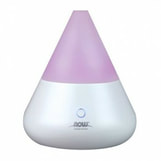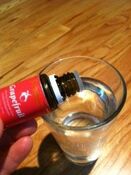What are Essential Oils?
Essential oils are the aromatic, volatile liquid that is within many shrubs, flowers, trees, roots, bushes and seeds and extracted through distillation. They are highly concentrated and far more potent than dried herbs because of the distillation process. Essential oils are the "life" of the plant.
A single essential oil can contain 80-300 chemical constitutes and 300-500 bio chemical constitutes depending on the particular chemistry of a plant different therapeutic actions can vary. An essential oil can not be duplicated synthetically they are too complex. Each harvest contains different chemical constitutes because each year they get a different amount of sun and rain. The same seed planted in different locations will also contain different chemical constitutes.
To be considered pure and therapeutic the oils must be distilled at low temperature and no synthetic ingredients added. Do not be tricked by advertisement that an oil is 100% pure. According the FDA regulations they allow a bottle of oil to be marketed as pure if it has 5 drops of true pure oil to 95 drops of any other substance. Adulterated mis-labeled essential oils may present dangers for consumers. Causing rashes, burns, skin irritations. Synthetic oils can mimic common essential oils but only 2% of the Essential oils distributed in USA are truly 100% pure and therapeutic. It is important to know about the integrity of the essential oil company or vendor.
How to be sure your essential oils are pure, therapeutic grade?
Ask your oil supplier questions.
* Are the fragrances delicate, rich and organic? Do they "feel" natural? *Do the aromas vary each batch? (if they do not they have been altered)
*Does the supplier grow and distill their own oils?
*Are the distillation facilities part of the farm where the herbs are grown (so oils are freshly distilled)
*Does your supplier use LOW pressure and LOW temperature to distill to preserve all of the fragile chemical constituents? are the cookers fabricated from costly food grade stainless steel allows to reduce the likelihood of the oils chemically reacting with metal.
*Does your supplier personally inspect the fields and distilleries where the herbs are grown and distilled?
*Does your supplier subject EACH batch of essential oils through multiple chemical analyses to test for purity and therapeutic quality and send out for 3rd party testing?
* Are your oils stored in dark colored glass bottles and kept in a cool dry place?
*Does the oil have an expiration date? ( 100% pure therapeutic grade will not because when stored properly the oils will maintain their properties beyond your lifetime.) Oils in the Egyptian tombs are as effective today and probably more because they are truly pure.
What if you purchase pure therapeutic grade oil and it does not smell pleasant to you?
When you smell a pure therapeutic grade oil the fragrance may "stink" and be unpleasant though it is not a "chemical" smell. When this happens your cells receptor sites are responding to the properties in that particular oil and is "stirring up" the incorrect programing in the cells. When you continue to smell that particular oil receiving its healing properties the cells is cleansed and reprogramed the fragrance will smell pleasing to you.
Essential oils are the aromatic, volatile liquid that is within many shrubs, flowers, trees, roots, bushes and seeds and extracted through distillation. They are highly concentrated and far more potent than dried herbs because of the distillation process. Essential oils are the "life" of the plant.
A single essential oil can contain 80-300 chemical constitutes and 300-500 bio chemical constitutes depending on the particular chemistry of a plant different therapeutic actions can vary. An essential oil can not be duplicated synthetically they are too complex. Each harvest contains different chemical constitutes because each year they get a different amount of sun and rain. The same seed planted in different locations will also contain different chemical constitutes.
To be considered pure and therapeutic the oils must be distilled at low temperature and no synthetic ingredients added. Do not be tricked by advertisement that an oil is 100% pure. According the FDA regulations they allow a bottle of oil to be marketed as pure if it has 5 drops of true pure oil to 95 drops of any other substance. Adulterated mis-labeled essential oils may present dangers for consumers. Causing rashes, burns, skin irritations. Synthetic oils can mimic common essential oils but only 2% of the Essential oils distributed in USA are truly 100% pure and therapeutic. It is important to know about the integrity of the essential oil company or vendor.
How to be sure your essential oils are pure, therapeutic grade?
Ask your oil supplier questions.
* Are the fragrances delicate, rich and organic? Do they "feel" natural? *Do the aromas vary each batch? (if they do not they have been altered)
*Does the supplier grow and distill their own oils?
*Are the distillation facilities part of the farm where the herbs are grown (so oils are freshly distilled)
*Does your supplier use LOW pressure and LOW temperature to distill to preserve all of the fragile chemical constituents? are the cookers fabricated from costly food grade stainless steel allows to reduce the likelihood of the oils chemically reacting with metal.
*Does your supplier personally inspect the fields and distilleries where the herbs are grown and distilled?
*Does your supplier subject EACH batch of essential oils through multiple chemical analyses to test for purity and therapeutic quality and send out for 3rd party testing?
* Are your oils stored in dark colored glass bottles and kept in a cool dry place?
*Does the oil have an expiration date? ( 100% pure therapeutic grade will not because when stored properly the oils will maintain their properties beyond your lifetime.) Oils in the Egyptian tombs are as effective today and probably more because they are truly pure.
What if you purchase pure therapeutic grade oil and it does not smell pleasant to you?
When you smell a pure therapeutic grade oil the fragrance may "stink" and be unpleasant though it is not a "chemical" smell. When this happens your cells receptor sites are responding to the properties in that particular oil and is "stirring up" the incorrect programing in the cells. When you continue to smell that particular oil receiving its healing properties the cells is cleansed and reprogramed the fragrance will smell pleasing to you.
How do Essential Oils work?
The molecules of 100% pure therapeutic grade essential oils are very small and penetrate the blood/brain barrier. Within 20 seconds of application the oils will penetrate the 100 trillion cells in your body and will minister to each cell as they were created to. The chemical constituents in each oil will effect each body differently according to each persons personal body chemistry.
The Essential Oils desk reference guide compiled by Life Science publishing and the Reference Guide for Essential oils are great tools to get to know Essential Oils.
The Essential Oils desk reference guide compiled by Life Science publishing and the Reference Guide for Essential oils are great tools to get to know Essential Oils.
How to use essential oils
TopicallyPlace the oil neet (undiluted) or diluted onto the area of need or a reflex point that pertains to your area of need.
Essential oils may also be added to vegetable oils and used to massage. When using one or more oils you can layer the oils by applying one oil after the other. Add a few drops to your bath water. |
DifuseBenefits of Diffusing and Inhaling 100% Therapeutic Grade Oil
Fragrance of an essential oil can directly affect everything from your emotional state to your life span. When a fragrance is inhaled the airborne odor molecules travel up the nostrils to the olfactory This is called the limbic system. The limbic system is directly connected to the parts of the brain that control heart rate, blood pressure, breathing, memory, stress levels and hormone balance. Essential oils can have profound physiological and psychological effects. The scent of a fragrance can evoke memories and emotions before we can even consciously be aware of it. The limbic lobe can directly activate the hypothalamus, one of the most important parts of the brain. It controls the body temperature, hunger, thirst, fatigue, sleep. It acts as our hormonal control center and releases hormones that can affect many functions of the body. The production of growth hormones, sex hormones, thyroid hormones and neurotransmitters such as serotonin are governed by the hypothalamus. Because of this the benefits of diffusing differ from topical and internal usage. |
Internally Many essential oils are Certified as GRAS
(Generally regarded as safe or as food additives and flavoring agents). Many oils are completely safe for ingestion. Culinary use is the most basic form. Or, you can use essential oils in your drinks. Keep in mind, however, that oil and water do not mix. Simply adding a drop to water will leave that drop undiluted. Some oils are irritants and all oils are strong. It is always best to dilute your essential oils. There are no scientific, evidence-based, anatomical, physiological, or even logical reasons to say that essentials oils are unsafe for human consumption. With proper use, the benefits of essential oils far outweigh any potential side effects. |




